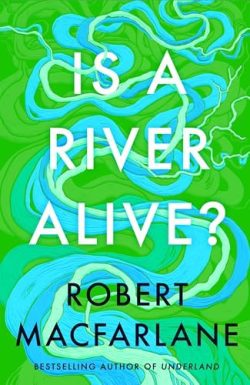 PRONOUNS have become weirdly political in the last few years – it is all-too-easy to cause offence by using the wrong one when addressing or referring to a person who has adopted “they” and “their” as their preferred form. Author, environmental campaigner, poet and philosopher Robert Macfarlane encounters the same problem in his new book, Is A River Alive? – and resolves it, almost subconsciously, by adopting a personal pronoun for rivers “who” flow through wild places, suffer exploitation and pollution, preserve life and play a crucial but not well-understood role in our long existence on the planet.
PRONOUNS have become weirdly political in the last few years – it is all-too-easy to cause offence by using the wrong one when addressing or referring to a person who has adopted “they” and “their” as their preferred form. Author, environmental campaigner, poet and philosopher Robert Macfarlane encounters the same problem in his new book, Is A River Alive? – and resolves it, almost subconsciously, by adopting a personal pronoun for rivers “who” flow through wild places, suffer exploitation and pollution, preserve life and play a crucial but not well-understood role in our long existence on the planet.
Macfarlane, whose previous books include the inspirational Underland and The Old Ways, has turned his attention to the plight of rivers, and to the fascinating question of whether a river is a living being, and if so, whether a river has rights. In conversation with naturalist Ben Hoar at the Guildhall, as part of this year’s Bath Literature Festival, he discussed the past, present and future of four rivers, which he explores in the book.
It was, he said, a significant day to be in Bath, as only that morning the Supreme Court ruled on the long-running controversy over wild camping on Dartmoor. The case involved landowners Alexander and Diana Darwall appealing against Dartmoor National Park Authority, over an area of the Commons known as Stall Moor. The five Supreme Court justices unanimously dismissed the Darwalls’ appeal, ruling that the relevant clause of the Dartmoor Commons Act 1985 conferred “a right of public access which includes wild camping.” Macfarlane welcomed the decision and the importance of public access, and reflected that many of the concerns about rivers, particularly in this country, revolve around access.
The central thread of Is A River Alive?* is the relationship, over many centuries, between human beings and rivers, and the author’s conclusion that rivers are not merely there for human use, but are living beings – who should be recognised as such in both imagination and law.
While this is a complex philosophical, legal and ethical argument, the book – and Macfarlane’s talk – is an exhilarating and highly entertaining exploration of four river catchments and eco-systems through their past, present and futures. The four rivers are a chalk stream near Macfarlane’s home in Cambridgeshire, the river that rises in the ancient Los Cedros cloud-forest in Ecuador, which is under pressure for exploitation by mining companies, the heavily polluted rivers, creeks and lagoons around Chennai in southern India, and the Mutehekau or Magpie in north-eastern Quebec, where First Nation and other campaigners are defending this spectacular wild river from death by damming.
 Ben Hoar described Is A River Alive? as “an epic poetic book, a love letter to rivers” – a description well-illustrated by readings from the book, with Macfarlane’s evocative prose, vast cultural and ecological knowledge and his sheer delight in the rhythms of words. For those familiar with his work, Bath’s Victoria Art Gallery has an exhibition running from 18th July to 5th October – The Lost Spells is a continuation and expansion of the Lot Words paintings of Jackie Morris and Macfarlane’s accompanying poems, celebrating British wildlife and the names of plants, birds and animals that were “lost” when excluded from the Oxford Children’s Dictionary. The Lost Words is now recognised as hugely important, with copies distributed to schools across the country.
Ben Hoar described Is A River Alive? as “an epic poetic book, a love letter to rivers” – a description well-illustrated by readings from the book, with Macfarlane’s evocative prose, vast cultural and ecological knowledge and his sheer delight in the rhythms of words. For those familiar with his work, Bath’s Victoria Art Gallery has an exhibition running from 18th July to 5th October – The Lost Spells is a continuation and expansion of the Lot Words paintings of Jackie Morris and Macfarlane’s accompanying poems, celebrating British wildlife and the names of plants, birds and animals that were “lost” when excluded from the Oxford Children’s Dictionary. The Lost Words is now recognised as hugely important, with copies distributed to schools across the country.
Brave and visionary judges in some countries – including Ecuador – have ruled that rivers have rights, but this remains a deeply contentious issue, and even an area like Los Cedros, which is many thousands of years old (perhaps a million years), is vulnerable to the powerful pressure of corporations (which DO have rights). Even a company like Thames Water, with its shameful record, has corporate “rights.”
The rivers in this book speak directly through Robert Macfarlane – “They are my co-authors,” he told the sold-out audience. But this is not a negative or pessimistic book. He welcomed news of the forthcoming Bath and Bradford-on-Avon Festival of Wild Waters,* and endorsing a suggestion from the floor that British rivers should be named wherever they are crossed by a road (as they are in, for example, France). “I am hopeful,” he said.
* Is A River Alive?, by Robert Macfarlane, published by Hamish Hamilton
** Wild Waters Festival, a series of curated events celebrating nature and local communities along the Bristol River Avon and its tributaries, run from 31st May to 15th June, between Bradford-on-Avon and Batheaston.